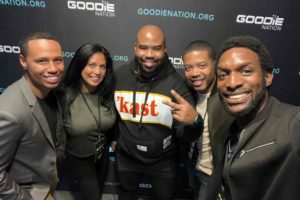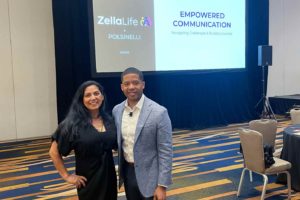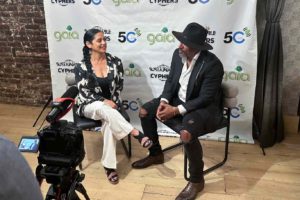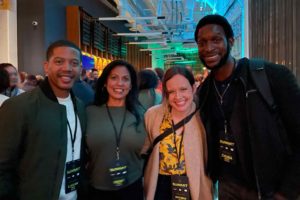CATEGORIES
Employee Happiness | People We Admire | Well-Being | Work CultureOverview:
- Remy Meraz had a multicultural childhood experience that presented both opportunities and challenges.
- Remy and co-founder Julian’s experiences in the workplace inspired them to create Zella Life to help empower professionals with emotional intelligence.
- Zella Life is focused on democratizing coaching and making it accessible to the diverse talent and middle management workforce.
- Finding your passion and purpose will give you more energy than anything else in your life.
- Practicing compassion toward oneself and understanding yourself better has been central to Remy’s growth and journey.
1. How did your upbringing and early years influence who you are today?
I grew up in a culturally diverse, biracial family. My father is Mexican, and my mother is Guamanian. My stepfather is African-American, and my stepmother is Filipino-American. The various cultural influences I was exposed to in my family presented both opportunities and difficulties.
I experienced and witnessed racial prejudice in my early years. I saw people staring at my mother and stepdad as an interracial couple in the U.S. Racial exclusion impacted me deeply as a child, causing confusion and disappointment.
Nevertheless, my diverse background has been an asset to me many times. I can fit in with any cultural context, religion, and socioeconomic circumstance. This adaptability has allowed me to develop a unique perspective and empathy, which have proven invaluable in my personal and professional relationships. It has also helped me challenge stereotypes and break barriers, fostering a more inclusive and accepting environment wherever I go.

2. What was your inspiration behind founding Zella Life?
My co-founder Julian and I had similar professional experiences that influenced our vision for Zella Life and the type of workplaces we wanted to help create. I’ve often been the only woman and/or person of “color” in the room throughout my career. I never had any leaders or mentors who looked like me. I also didn’t feel psychologically safe at work to discuss challenges like racism or gender bias at workplace in a male-dominated field.
I invested in my coaching and therapy to increase my emotional intelligence. I discovered that I had blind spots, internal issues such as imposter syndrome, and racial trauma from my youth and previous employment. I became aware that I was bringing all of this into the workplace. Empowered with this knowledge and the emotional tools to handle it, I began achieving my career goals, which led to leadership opportunities and salary increases.
Knowing the power of coaching and the need for belonging and inclusion in the workplace, Julian and I created Zella Life by applying our learnings. For example, I have imposter syndrome—not an uncommon phenomenon among employees that limits their potential to take on more responsibilities. These were the kinds of issues we wanted to help professionals with.
Even though coaching has recently begun to gain acceptance, there are still stigmas attached to it. Particularly in the case of executive coaching, many individuals are not familiar with it. It is often thought of as something only available to executives, rich, or white people. Zella Life focuses on making coaching more accessible and scalable, especially for businesses that want to upskill their diverse talent and middle management workforce. These two groups are the largest and most underserved workforce groups when it comes to professional development.
3. What are your future plans and vision for Zella Life?
My vision for Zella Life is to help organizations elevate and advance a million talented professionals and show them the power they have within. I want to make corporate America’s leadership landscape reflect the diverse population of our nation and the world. I want our organization to transform into a unicorn and become a game changer in how leadership coaching is perceived and delivered.
One of the new projects we recently finalized is a pilot program with Intuit and the Los Angeles Urban League. The program provides executive coaching, business software and implementation, and business consulting to 25 diverse business owners. So essentially, the leaders will receive both technical and soft skill training, which will trickle down and benefit their teams and the larger community. Projects like these get me excited and confident about Zella’s future because of the social impact.

4. How do you think the mindset toward people of color has changed in the last decade?
That’s a fascinating question, and I’ll talk about it from the standpoint of someone who lives in the U.S. Over the past ten years, there has been an increase in the number of businesses and departments focusing on diversity, equity, and inclusion (DEI). Organizations have begun recognizing, including, and empowering employees from diverse backgrounds. While there has been progress and positive change in the area, social justice issues like George Floyd’s case highlight the distance we still need to cover.
We wouldn’t need DEI initiatives if we could increase everyone’s EQ, their emotional intelligence—and by everyone, I mean all people, no matter what background you come from. Because we would then operate from higher frameworks: greater empathy and self-awareness. Instead of impulsively reacting, we would learn to respond to situations from a place of humanity rather than anger, bias, or fear. People often overlook that, irrespective of their backgrounds, everyone has individually experienced collective trauma, particularly in the last 3-4 years.
Simultaneously, we have also seen ardent proponents of call-out culture, especially with powerful tools such as social media. Calling out some behaviors is necessary. However, some individuals have taken this in extreme ways. They lash out at those who aren’t woke and feel entitled to cancel other people right away. In fact, the cancel and call-out culture is polarizing more and more. Instead, we should call in with responses rooted in objectivity, kindness, grace, understanding, or curiosity.
I think Maya Angelou says it best in her book, Wouldn’t Take Nothing For My Journey Now, “Perhaps travel cannot prevent bigotry, but by demonstrating that all peoples cry, laugh, eat, worry, and die, it can introduce the idea that if we try and understand each other, we may even become friends.” She’s using travel as the change agent. I agree and would also add coaching. Because coaches can help you see your blind spots and challenge and hold you accountable in a way our friends, family, and colleagues can’t.
5. Please share some insights or lessons you have learned as a leader in social impact.
One of the most important things I’ve learned is the significance of having subject matter experts on your team. As a leader, you should be aware of your strengths and weaknesses. You don’t have to know everything, but team members should soar where you are weak. The partners you choose must be superhumans in their respective areas of expertise and function at the same high-level pace as you. Another thing I learned while working around social impact is the value of patience. Building a scalable service and technology business that affects social change does not happen overnight. It takes time and resources. Therefore, finding clients, partners, stakeholders, and team members who align with your mission, vision, and values is important. This requires you to exercise patience because nothing is solely about social impact in our world.

6. What are some of your most important life values?
In my opinion, having a growth mindset is the most essential virtue because it expands your consciousness and allows you to move forward in life. A growth mindset will have you seeking solutions when facing challenges or conflict. A growth mindset will keep you curious and open to different ideas and perspectives, allowing you to interact more collaboratively with others.
Secondly, I place great importance on consistency—acting for and remaining dedicated every day towards my vision and goals. I focus on consistently living a purpose-driven life and spending my time and energy on what truly brings me joy. Staying in alignment with these values has helped me live a more fulfilling and abundant life in ways I never imagined.
7. How do you keep going even when you feel hopeless?
Reframing is the key to everything. Before delving deep into coaching and therapy, when things weren’t going well, I would feel hopeless. Experiencing challenges no longer leads to hopelessness; instead, I feel frustrated but see them as opportunities for growth. I’ve learned to reframe difficulties as chances to improve and become a better version of myself. I’m now driven by curiosity to see what comes from learning. Re-evaluating our perspective and thoughts is essential. Our thoughts shape our feelings, and those feelings, in turn, drive our behaviors. When it comes to building a business, it’s imperative to find your “why.” It’s the reason you do your job and absolutely LOVE it. The connection and passion for your “why” will give you more energy than anything and drive you into action on difficult days.
Understanding why I behave or think the way I do has been crucial to my growth. About 20 years ago, I received a diagnosis of ADHD, and I can honestly say that it was the best gift ever given to me. I now know and understand why I behave in a certain way. It allowed me to find tools to create systems and processes to manage the disorder more effectively and help me achieve my personal and professional goals. In doing so, I learned how to get out of my own way and experience more success and emotional freedom. Changing or modifying our behavior becomes easier as we get to know ourselves. By investing in our personal development and practicing self-compassion and grace, we became aware of our limitations and powers. We can then learn to be kinder and gentler because we tend to be the hardest on ourselves.

Conclusion:
Remy’s journey exemplifies how one can become aware of one’s own self-created barriers and tap into one’s true potential by practicing compassion and grace. Zella Life aims to enhance workforce mental fitness, promote diversity, equity, and inclusion for talent attraction and retention, and ensure long-term sustainability through emotional intelligence principles.


